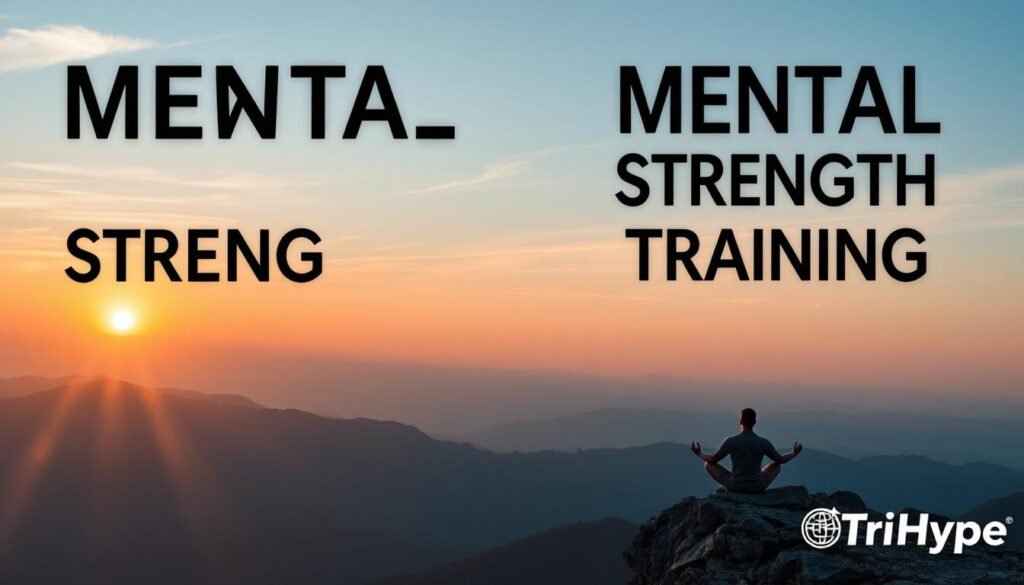In this guide, we’ll dive into what mental strength is and why it matters. We’ll share tips to boost your mental strength. You’ll learn about mindfulness, cognitive strategies, and emotional intelligence.
These tools will help you grow stronger mentally. They’re key for facing life’s challenges head-on.
Key Takeaways
- Understand the core components of mental strength, including resilience and emotional intelligence
- Discover the significance of mental strength training for personal and professional development
- Learn mindfulness exercises and cognitive-behavioral strategies to cultivate mental fortitude
- Explore techniques for building resilience and developing a growth mindset
- Acquire practical skills for managing stress and fostering a positive, self-compassionate outlook
Defining Mental Strength
Mental strength is about facing and beating challenges, staying focused, and getting back up after falls. At its heart is resilience – the power to adapt and grow when things get tough. Also, emotional intelligence is key, covering self-awareness, managing feelings, and understanding others.
The Essence of Resilience
Resilience is the foundation of mental strength. It means bouncing back from hard times, adjusting to new situations, and staying positive. People with resilience have special skills and attitudes that help them deal with tough spots.
Cultivating Emotional Intelligence
Emotional intelligence, or EQ, is also crucial for mental strength. It includes knowing yourself, controlling your feelings, being motivated, empathetic, and good with people. Those with high EQ can handle their emotions, see things from others’ viewpoints, and make smart choices. This boosts their mental toughness.
| Resilience | Emotional Intelligence |
|---|---|
|
|
Building both resilience and emotional intelligence helps people develop strong mental strength. This lets them face life’s hurdles with courage and determination.
“Mental strength is not the absence of fear, but the ability to move forward in the presence of fear.” – Unknown
The Importance of Mental Strength Training
Investing in mental strength training is key for handling life’s challenges. It helps us manage stress, make smart choices, and reach our goals. This leads to success in both our personal and professional lives.
Mental strength training has many benefits. It builds resilience, helping us recover from tough times. It also boosts emotional intelligence, making us better at understanding and controlling our feelings. This improves how we connect with others.
It also sharpens our decision-making skills. Being mentally strong means we can think clearly, analyze information well, and make choices that match our values. This helps us achieve our long-term goals.
Adding mental strength training to our daily lives helps us thrive in a changing world. It boosts our self-confidence, motivation, and control over our lives. This investment in our mental health pays off in many ways.
| Benefits of Mental Strength Training | Outcomes |
|---|---|
| Builds Resilience | Improved ability to bounce back from challenges |
| Enhances Emotional Intelligence | Better understanding and regulation of emotions |
| Improves Decision-Making | Enhanced critical thinking and problem-solving skills |
| Cultivates Self-Confidence | Increased motivation and sense of control |
By focusing on mental strength training, we can reach our full potential. We can handle life’s complexities more easily and successfully.

“The greatest weapon against stress is our ability to choose one thought over another.”
Mindfulness Exercises for Mental Fortitude
Building mental strength is key to facing life’s tough times. Mindfulness helps us stay present and aware of our thoughts and feelings. By adding mindfulness to our daily lives, we grow stronger and more resilient.
Mindful Breathing Techniques
Mindful breathing is at the core of mindfulness. It helps us stay focused, calm, and in control. Here are some easy exercises to try:
- Box Breathing: Inhale for 4 counts, hold for 4 counts, exhale for 4 counts, hold for 4 counts. Repeat.
- Alternate Nostril Breathing: Close off one nostril and inhale through the other, then switch and exhale through the previously closed nostril.
- Mindful Breathing Walk: As you walk, pay attention to the sensation of each step and the flow of your breath.
Regularly practicing these breathing exercises can make us more resilient. It helps us handle life’s ups and downs better.
| Mindfulness Exercise | Duration | Benefits |
|---|---|---|
| Box Breathing | 5-10 minutes | Reduces stress, promotes calm, enhances focus |
| Alternate Nostril Breathing | 5-10 minutes | Balances the nervous system, improves concentration |
| Mindful Breathing Walk | 10-15 minutes | Combines physical and mental awareness, boosts mood |
Adding these mindfulness exercises to your day can change your life. They help build mental fortitude and resilience. By practicing mindful breathing, you’ll face challenges with more clarity and strength.
Cognitive-Behavioral Strategies
Building mental strength is more than just pushing through tough times. It’s about understanding our thoughts and how they affect us. Cognitive-behavioral strategies are key to boosting our mental toughness.
By spotting and questioning negative thoughts, we can change our outlook. This helps us handle tough situations better. It lets us control our thoughts and feelings, making us more proactive.
- Recognize and challenge negative self-talk. Replace “I can’t” with “I can try.”
- Practice cognitive reframing. Reframe setbacks as opportunities for growth.
- Cultivate a growth mindset. Embrace challenges as a chance to expand your capabilities.
Using these cognitive-behavioral strategies helps us grow mentally. It lets us face and beat obstacles. By changing our thoughts, we improve our well-being and resilience.
| Cognitive-Behavioral Strategies | Benefits |
|---|---|
| Identifying and challenging negative thought patterns | Adopts a more constructive, resilient mindset |
| Practicing cognitive reframing | Reframes setbacks as opportunities for growth |
| Cultivating a growth mindset | Embraces challenges as a chance to expand capabilities |

“The greatest weapon against stress is our ability to choose one thought over another.” – William James
Resilience Building Through Adversity
Resilience is key to bouncing back from tough times. It’s about facing challenges head-on and seeing them as chances to learn and grow. This mindset helps us stay strong and keep moving forward, even when things get hard.
Embracing Challenges
We should look for and take on tough experiences. These can be anything from learning a new skill to dealing with a personal crisis. By tackling these challenges, we build our resilience and confidence.
Developing a Growth Mindset
A growth mindset is essential for resilience. It’s believing that our skills can grow with effort and hard work. This mindset helps us keep going, even when we face setbacks. It turns failures into chances to learn and improve.
“The greatest glory in living lies not in never falling, but in rising every time we fall.” – Nelson Mandela
By facing challenges and adopting a growth mindset, we reach our full potential. This approach not only helps us get through tough times but also leads to success in our personal and professional lives.
Emotional Intelligence Training
Developing emotional intelligence helps us understand and manage our feelings and those of others. It boosts our mental strength. This skill lets us make better choices, talk clearly, and form strong bonds. All these help us stay mentally strong and resilient.
Emotional intelligence training teaches us important skills. We learn to:
- Identify and name our emotions with clarity
- Regulate our emotional responses in healthy ways
- Demonstrate compassion and understanding towards others
- Effectively navigate interpersonal conflicts and challenges
- Cultivate a growth mindset and resilience in the face of adversity
- Enhance our decision-making abilities and problem-solving skills
Ultimately, emotional intelligence training empowers us to become more self-aware, self-regulated, and socially adept individuals – traits that are essential for building and maintaining mental strength.
“Emotional intelligence is the ability to recognize, understand, manage, and reason with emotions. It’s about being smart with feelings.” – Daniel Goleman

By investing in emotional intelligence training, we can unlock the full potential of our mental strength. This leads to more fulfilling personal and professional lives.
Mental Strength Training
Building mental strength is key to growing personally and succeeding in life. Through specific exercises and techniques, we can get better at handling tough situations. This helps us push past our limits.
Psychological Conditioning Exercises
Doing exercises that improve our mind can really boost our mental strength. These activities help us think better, stay focused, and be more resilient. Here are some effective ones:
- Cognitive Flexibility Drills: These tests our problem-solving skills and ability to adjust to new situations. They make us think more quickly.
- Visualization Practices: Using visualization helps us mentally prepare for tough times. It boosts our confidence and decision-making.
- Mindfulness Meditation: Regular mindfulness meditation improves our awareness and emotional control. It clears our minds and helps us stay calm.
- Mental Rehearsal: Mentally going over challenging tasks helps us find good strategies. It builds our mental strength to do them well.
Adding these exercises to our routine can make us more resilient and agile. This way, we can face challenges head-on and reach our goals.
| Exercise | Benefits |
|---|---|
| Cognitive Flexibility Drills | Improved problem-solving skills, adaptability |
| Visualization Practices | Enhanced confidence, decision-making abilities |
| Mindfulness Meditation | Increased present-moment awareness, emotional regulation |
| Mental Rehearsal | Effective strategy development, mental stamina |
“The only way to do great work is to love what you do. If you haven’t found it yet, keep looking. Don’t settle.” – Steve Jobs
By making these mental strength training exercises a part of our daily lives, we can build the psychological conditioning needed to succeed. We can overcome obstacles, reach our full potential, and achieve great success.
Stress Management Techniques
Managing stress is key to building mental strength. We can do this by finding out what stresses us and learning how to handle it. This way, we become more resilient when faced with tough times.
Identifying Stress Triggers
The first step is to know what causes us stress. Common stressors include:
- Too much work or tight deadlines
- Conflicts with others or tough relationships
- Money worries or financial instability
- Health problems or medical issues
- Big changes or life transitions
Knowing what stresses us helps us find better ways to deal with it.
Stress Management Techniques
After figuring out what stresses us, we can start using various techniques to manage it:
- Mindfulness and Relaxation Practices: Activities like meditation, deep breathing, or yoga can calm us down. They help reduce stress’s physical effects.
- Time Management Strategies: By focusing on what’s important, learning to share tasks, and setting achievable goals, we can handle our workload better. This reduces feeling overwhelmed.
- Social Support: Talking to friends, family, or a therapist can offer emotional support. It also helps us see stressful situations in a different light.
- Physical Exercise: Regular exercise boosts mood and well-being. It helps us deal with stress better.
- Cognitive-Behavioral Techniques: Changing negative thoughts can help us see stressful situations more positively.
Using these techniques daily can help us build mental strength. This way, we can handle life’s challenges better.
Cultivating a Positive Mindset
Having a positive mindset boosts our mental strength. By changing our thoughts and looking for chances, we can grow mentally. This helps us beat challenges and reach our goals.
Practicing gratitude is a good start. Thinking about the good things in our lives makes us stronger. Also, learning from mistakes helps us grow and see challenges as chances to get better.
It’s also important to be around people who support us. This means choosing who we follow online and who we hang out with. We should pick those who share our positive mindset and mental strength goals.
“The greatest weapon against stress is our ability to choose one thought over another.”– William James
By doing these things, we can learn to find solutions and stay positive. Building a positive mindset changes us in amazing ways. It helps us reach our full potential and grow our mental strength.
| Strategies for Cultivating a Positive Mindset | Benefits |
|---|---|
|
|
The Role of Self-Compassion
Building mental strength is greatly helped by self-compassion. It’s about treating ourselves with kindness and understanding. This is key to emotional resilience.
By letting go of harsh self-criticism, we can be more supportive to ourselves. This inner kindness helps us face life’s challenges more easily.
Treating Yourself with Kindness
Self-compassion has three main parts: self-kindness, common humanity, and mindfulness. Self-kindness means being gentle with ourselves, not harsh. Common humanity reminds us we’re not alone in struggles. Mindfulness helps us watch our thoughts without getting lost in them.
Being kind to ourselves helps us bounce back from failures. Instead of beating ourselves up, we can learn from mistakes. This builds our mental strength and resilience.
“Self-compassion is not self-pity. It is the ability to comfort and take care of ourselves, to forgive ourselves, to accept ourselves as we are. Self-compassion is a powerful tool for emotional resilience.”
Self-compassion lets us have a kinder inner voice. This voice empowers us to face challenges with confidence. It’s a crucial part of mental strength, keeping us balanced even when things get tough.

Developing Mental Toughness
Mental toughness is key to building mental strength. It helps us face challenges, overcome obstacles, and reach our goals. By being mentally tough, we can be resilient and determined, unlocking our full potential.
At the core of mental toughness are goal-setting and self-discipline. Setting clear goals and sticking to them builds our mental strength. This focus, along with a willingness to face challenges, is what makes us mentally tough.
It’s also important to see challenges as chances to grow. A growth mindset lets us learn and improve from every obstacle. This adaptability and openness to learning are what make us mentally resilient.
| Strategies for Developing Mental Toughness | Benefits of Mental Toughness |
|---|---|
|
|
By using these strategies, we can change our mindset and reach our full potential. Unwavering focus, a commitment to growth, and facing challenges head-on are key. These traits help us thrive in tough times and achieve our biggest dreams.
“Mental toughness is essential for success, as it allows us to push past our limits and achieve the extraordinary.”
Enhancing Emotional Agility
Building emotional agility is key to mental strength. It lets us understand, accept, and adjust to our feelings. This way, we can handle tough times better and stay clear-headed.
Navigating Difficult Emotions
Emotions, both good and bad, are a big part of being human. But dealing with hard feelings like stress or disappointment is crucial. Learning to know and manage our emotions helps us face challenges with strength and clarity.
Mindfulness is a great way to deal with tough emotions. It helps us watch our thoughts and feelings without judgment. This way, we can respond better and grow our emotional agility and mental strength.
“Emotional agility is not about ignoring difficult emotions. It’s about facing them courageously and compassionately, and then moving forward in a way that brings out our best.” – Susan David, Psychologist
Using cognitive-behavioral strategies also helps manage hard emotions. By changing negative thoughts, we can see things in a better light. This helps us handle tough situations more effectively.

Improving emotional agility takes time and effort. It’s about accepting our feelings, being aware of ourselves, and finding good ways to cope. By doing this, we build the mental strength needed to face life’s ups and downs with resilience and emotional balance.
Building a Supportive Network
Having a supportive network of family, friends, and like-minded people is key to boosting our mental strength. Meaningful connections and the support of our network can help us stay strong and emotionally well. This makes it easier to face challenges and reach our goals.
To build a supportive network, start by identifying who supports you. This could be close friends, family, mentors, or online groups that share your interests. By investing in these relationships and looking for ways to connect, we build a strong support base for life’s ups and downs.
It’s also crucial to think about getting professional help, like therapy or counseling, when needed. These services can teach us better ways to cope, manage stress, and think more positively.
- Surround yourself with a network of supportive individuals who can offer emotional, practical, and social support.
- Actively engage in activities and hobbies that allow you to connect with like-minded people and build a sense of community.
- Seek out professional help, such as therapy or counseling, to enhance your mental strength and emotional well-being.
Investing in a supportive network gives us a valuable resource for facing life’s challenges. Remember, you don’t have to face everything alone. With the right support, you can achieve your goals and live a more fulfilling life.
Incorporating Mental Strength into Daily Life
Adding mental strength to our daily routines boosts our psychological resilience and well-being. By making mindfulness and other mental fortitude techniques regular, we build the skills to handle life’s challenges.
Mindfulness exercises are a great way to add mental strength to our days. Just a few minutes of deep breathing or meditation each day can help us stay focused and calm. This reduces stress and helps us manage tough emotions better.
Using cognitive-behavioral strategies in our daily lives is also helpful. This includes changing negative thoughts, setting realistic goals, and celebrating our achievements. By controlling our thoughts and actions, we build mental resilience to face life’s hurdles.
“The greatest weapon against stress is our ability to choose one thought over another.” – William James
Building mental strength in our daily lives is a journey of self-discovery and growth. By consistently working on our mental well-being, we gain the inner strength to succeed in our personal and professional lives.

Empower yourself! Develop mental strength
Conclusion
Mental strength is key to our well-being. By doing mental strength training, we can grow and face challenges better. This journey helps us grow personally and professionally, making life more rewarding.
We’ve looked at what mental strength is and why it matters. We’ve shown you how to build it through mindfulness and other strategies. By facing challenges head-on and staying positive, we become stronger.
Building mental strength is a journey of self-discovery. By living these principles, we become more emotionally agile and connected. Remember, every step towards mental strength makes us more resilient and empowered.
